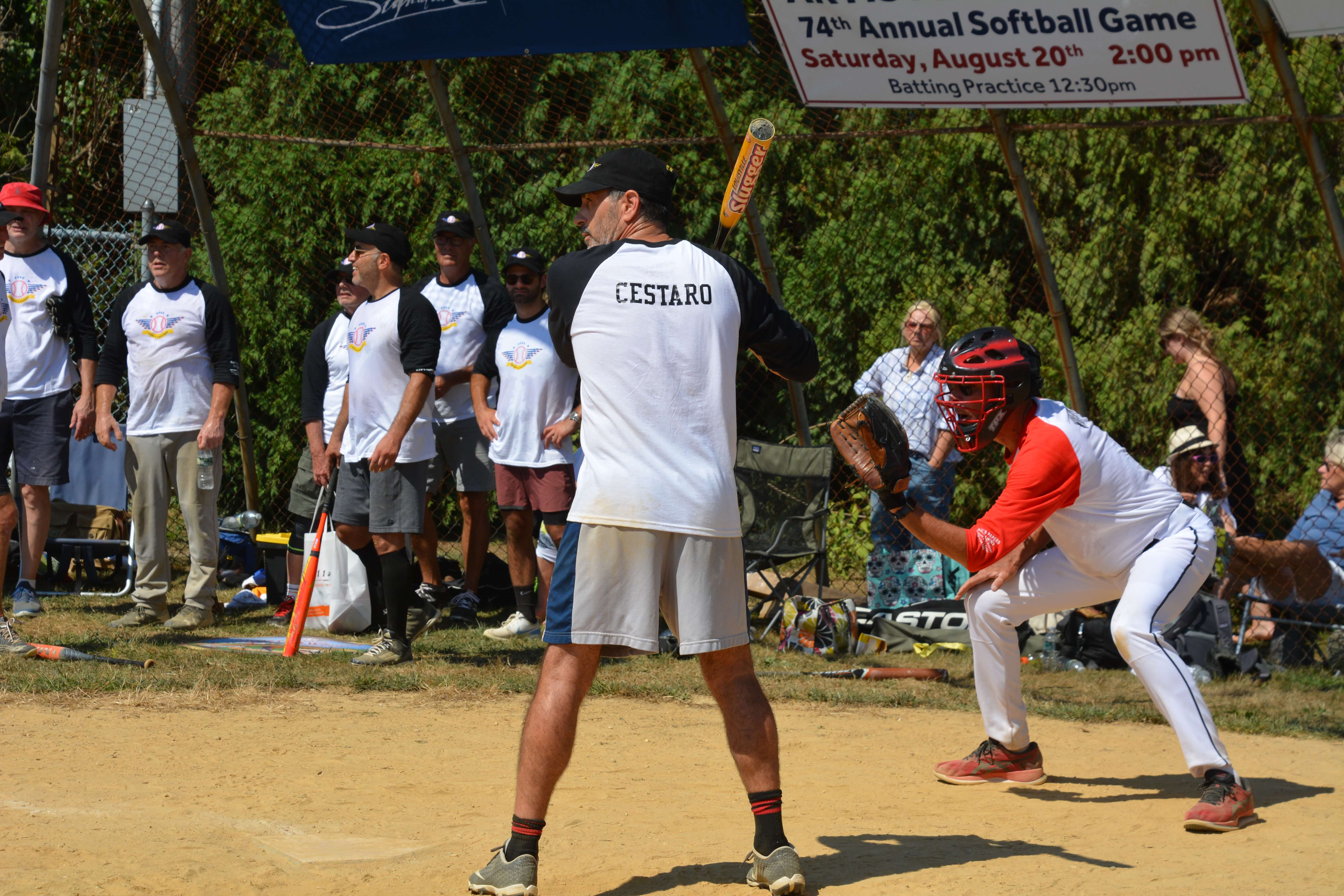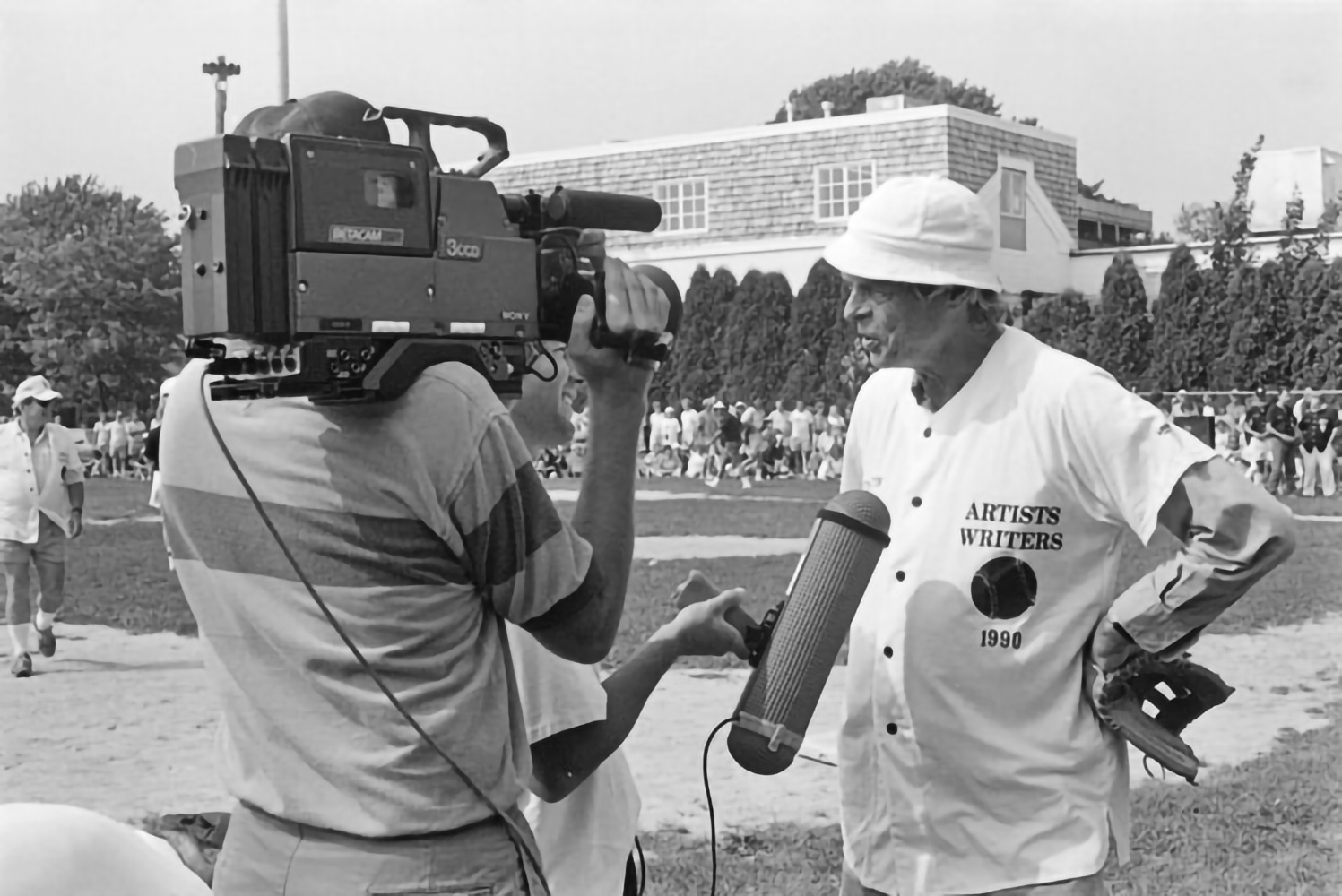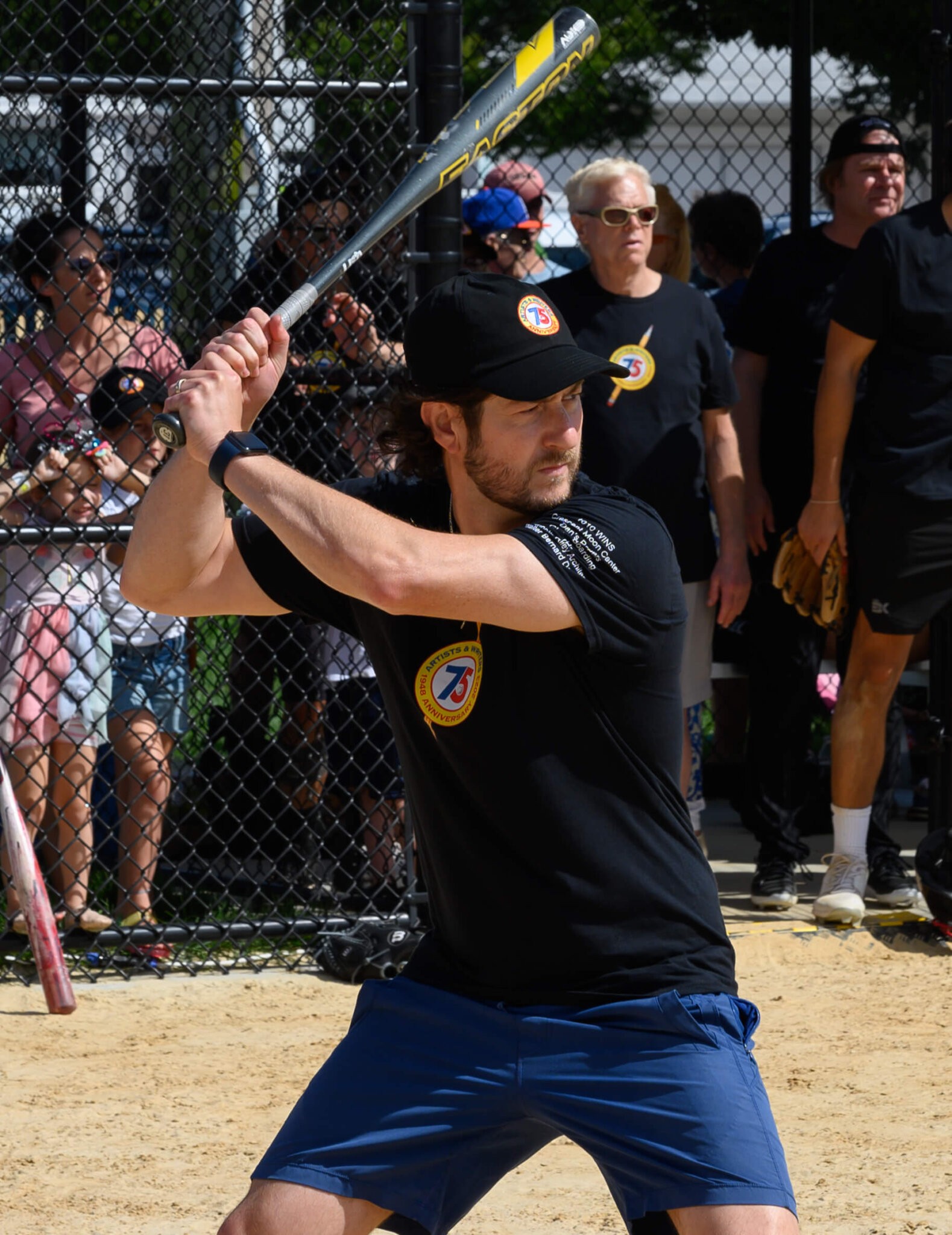Artists & Writers Game Over the Years: Games In the 1970s & the Greatest Half Inning Ever Played

Although the first Artist-Writers Game took place in 1948 (Jackson Pollock, Willem de Kooning, Franz Klein), I first took interest in it in 1972. At the time, I was a young upstart with 12 years under my belt running Dan’s Papers, a new free newspaper, the first ever to be published in America, as far as anybody knew. Although there was a report in another publication that I hit a single in this game, I wrote no report in Dan’s about it or anything else taking place in that year’s game. The game seemed kind of weird to me. The nationally known painters and sculptors on one side, the literary lions on the other, all stumbling and schlepping through a baseball game for charity on a baseball field behind the East Hampton supermarket. But I did report about the game in 1973, and then almost every year, often umpiring, through to the present day.
As I have this long connection to the game, I must note that painter Leif Hope also played from when I first started, and it’s said, even before me. And here he is today, the respected organizer of this annual event. And here am I, still writing in Dan’s Papers. Below are excerpts from these newspaper reports in the 1970s. And at the end, “the greatest half inning ever played,” which happened in 2022.
But please note these excerpts are not about who hit long home runs or made sensational diving catches. There were dozens of those. This account is about the sense and feel of “the game,” not the heroics.
This year’s 2024 Artists & Writers Game falls on Saturday, August 17. Batting practice begins at noon and the game starts at 2 p.m. at Herrick Park in East Hampton.
Artists & Writers Game Through the Years
1973
Before this game, kids from East Hampton Head Start, the charity that year, came out to the pitcher’s mound and sang — not “The Star Spangled Banner” — but “Row, Row, Row Your Boat” and “Bingo.” The crowd of about 400 spectators applauded afterwards.
And so it began, a grand slugfest, with a great conclusion. In the top of the ninth, the Artists, way behind, scored 6 runs to take the lead 12 to 11. However, the Writers got 2 in the bottom of the ninth to win.
There was a certain inevitability about that. Before and during this game, there was much talk about the fact that since 1968, every year, the Writers won. Five years in a row. Why was that? Writers tapping away on typewriters all day getting no exercise then coming out all fresh and willing, to win? While the Artists, flinging paint all morning and half in the bag by noon now out at game time exhausted? That was as good a theory as any. And here it was, the Writers, shocked to fall behind in the ninth, grasping victory from defeat.
In this game I played right field for the Writers batting eighth, coming to bat directly after playwright Jimmy Kirkwood (A Chorus Line). I went 1 for 3. I also scored a run. I confess to having no memory of this.
Others who played for the Writers included folk singer Tom Paxton, novelist Sylvia Tennenbaum (The Rabbi’s Wife), author Peter Maas (Serpico), playwright and screenwriter Murray Schisgal (Luv, Tootsie), and playwright Adolph Greene (On the Town, The Will Rogers Follies). Leif Hope was catcher for the Artists.
Also playing for the Artists were painters Jimmy Ernst and Esteban Vincente, also bad-boy hippie Abbie Hoffman (who, between the second and third pitches thrown to him, ran off to steal first base). He got hooted back to continue hitting. And he did hit, but was thrown out.
Umpiring at third base that year was feminist Betty Friedan (The Feminine Mystique). During the whole game, she just stood there, looking very serious. For a while, Abbie Hoffman came over to talk with her. Gwen Verdon, the Broadway dancer and show star (Chicago), tried umpiring calling balls and strikes from behind the mound, but after quickly discovering she had no idea how to do this, agreed to be allowed to umpire at short center field.
The big hitter in this game for the Artists was Ben Heller, who, in the 1950s had purchased the painting “One, Number 31, 1950” by his good friend Jackson Pollock for $8,000. He also bought “Blue Poles” for $32,000. Now, in 1973, he sold “Blue Poles” to the National Gallery of Australia for $1.2 million. When later, he used this fortune to try to create a housing development of 300 wooded acres in Northwest, people resented him for trying to spend Pollock money like that in their bucolic community. But that was way after 1973. This year he went 3 for 3 and in the ninth inning hit a grand slam home run that briefly gave the Artists the lead.
1974
This was the game in which the Artists broke their long losing streak. They trounced the Writers 12-1. Ben Heller pitched for the Artists, raconteur and prankster George Plimpton (Paper Lion) pitched for the Writers. Others playing included painters Sheila Isham, Sculptor Bill King and actor Eli Wallach.
A real treat in this game was watching Eugene McCarthy, the Democratic senator from Minnesota who’s strong showing as a candidate for president in the 1968 primary, caused President Lyndon Johnson to announce he would step down after his term ended rather than continue against McCarthy, this anti-war candidate. McCarthy did not win in 1968, but ran again for President in 1972 and he would, after this softball game, mount an effort in 1976 as an Independent. At this game, iron willed and gray haired at 50, he played first base with a great flair, hitting a double and scoring the only run for the Writers. In a later inning, he had another hit, a single. It was then, as he took a short lead off first base, that I saw he had split the seam in the back of his white shorts. Nobody seemed to notice. And the game went on. Later in the rally, now on second base, though, he got pulled for a pinch runner so he could change. And as he left the field, the announcer, publisher Gardiner Spungin gleefully announced “Eugene McCarthy will not run.”
Also at this game, I learned that the 1968 game had been a fundraiser for McCarthy’s candidacy. (It was called “Clean for Gene.”)
I played left field. And at one point, a pedestrian walked across that field and asked me who was winning. I told him the Artists. He stopped in his tracks. “No,” he exclaimed.
The New York Times sent a writer out to cover this game. The article about it, I was later told, appeared September 1, 1974.

1975
Eugene McCarthy again played, and again he played wonderfully. At one point, he beat out a single to first base by shoulder blocking the first baseman in his path to the ground so he couldn’t catch the ball. Then, as he helped the first baseman up, uninjured, he said, “and they say I lack aggressiveness.”
Pop Artist Matsuoko Skeda played, as did Willie Morris, publisher of Harper’s Magazine, and author James Jones (From Here to Eternity.)
Art Gallery owner Elaine Benson, who’d been manager of the Artists until this year, had turned the job over to artist Warren Brandt. Brandt told a reporter from New York magazine that he had researched the history of the game and it was first played in 1954. Present to watch this game were Esteban Vicente, sculptor Philip Pavia and photorealist painter Howard Kanovitz, all who had played in that earlier game.
Again a slug fest. The Writers won 18 to 15.
1976
There was only a brief report about the Artist-Writers Game in Dan’s Papers this year. A featured player was Carl Stokes, the former Mayor of Cleveland, now an activist who worked as a commentator for NBC.
1977
Painter Audrey Flack played second base for the Artists. Mike Burke, the President of the New York Yankees, the New York Knicks and Madison Square Garden, also played.
Others, playing for the Writers, were newspaper scion Bunky Hearst, author Arthur Blaustein and food writer Miriam Ungerer. New artists were Louis Trakis, Jeffrey Meizlik and Carl Christensen. The game was close until the sixth inning. With the score 5-5, publisher Willie Morris came in to pitch for the Writers. He lobbed in the slowest pitches imaginable, and the Artists swatted them far and wide with glee. Final score was Artists 13, Writers 7.
I played for the Artists in this game, bouncing out to third in my only appearance.
Some interesting commentary — a wannabe ball player to one of the coaches:
“What do I have to write about to get in this game?”
“Sex Novels,” was the reply. “Or having your book on The New York Times Bestseller List. The farther up, the closer you get to being allowed to play.”
1978
Investment banker Felix Rohatyn, now the Chairman of Big MAC, popped out to shortstop in this game. Others who played were, for the Artists, Syd Solomon, Boris Kroll and Eric Ernst.
And just before the game began, I learned that I would be the lead off hitter. Quickly, I searched for this favorite bat I had used during batting practice earlier. Felix Rohatyn had it, so I snatched it from him.
As I sauntered toward the plate, I noticed that a spectator had arrived along the third base line carrying a copy of Dan’s Papers. That cheered me. He’d have something to read. But then he set it down on the ground and sat on it.
“Ball one,” the umpire said.
I swung at the next pitch, and hit a spinning popup to short, which was caught. After that, the coach took me out.
Eventually, the Writers won 9-8, but they did so only after they had snuffed out an Artists rally in the ninth. One run behind, the Artists had runners on first and third with two out and it was up to Artist Leif Hope coming to the plate.
It was late in the day at this point, and the sun was sinking in the west. Looking out from behind the backstop to see how this was going to turn out, I saw what appeared to be a group of about 12 spectators jogging out onto left field. Others saw it. Heads turned. There was a pause in the action.
The folks in left field fell to the ground out there and began doing pushups and sit ups. Apparently, they were members of some sort of health club who had reserved left field with the Village for that time, and so, had gone out to seize what was theirs.
Well, they had every right.
Leif Hope then grounded out to short, and the game was over.
1979
Again, Ben Heller played and was a star. Also playing were novelist Avery Corman, (Kramer Vs. Kramer), Peter Maas again, Carl Bernstein (All the President’s Men), Willie Morris, novelist and satirist Wilfrid Sheed (The Boys of Winter) and boxing commentator Larry Merchant. Playing for the Artists now were Mike Solomon, Rocco Liccardi and Judy Kleinsrud. Activist Carl Stokes was also back to play in the game.
Leif Hope was now the manager of the Artists team. He hadn’t asked for the job. The Artists just insisted he do it.
And for some reason, other powers that be had hired a real live official professional umpire to adjudicate this game. He wore a uniform with a patch on his shoulder reading U. S. Umpire’s Association and a nameplate on his chest that read M Tangel. He carried a black bag containing extra softballs, a plastic strike and ball counter and, in various pockets, an official whisk broom and an official yellow penalty handkerchief. He stood, for most of the game, behind home plate, fiercely serious, shouting the strikes and balls and controlling everything.
“Batter Out! No Good. Dead. Get Back!”
People ran around doing his bidding. And the Writers won 9 to 5.

THE GREATEST HALF INNING EVER PLAYED
From behind the pitcher’s mound, he did it quite well. He continued umpiring until the end of the fifth inning when, surrounded by his ever-present Secret Service men in their dark suits and ties, went off to his next activity.
Had the ninth inning been different had he stayed? We will never know.
The first batter to come to the plate in the bottom of the ninth was New York Daily News sportswriter Mike Lupica. The score was Artists 18, Writers 2. Three outs and it would be done.
Lupica singled to right. His son Alex, a substitute, came up next and singled to left. Next up was David Baer, a writer and last year’s MVP. He doubled to left, bringing home both Lupicas. And then Jerry Xie, a Wall Street analyst, singled through the second basemen’s legs. The score was now 18 to 5 and nobody out. The Writers were stirring.
The next batter should have been out. He was Dan Pulick, and his easy grounder to short was thrown to first, but the first baseman dropped the ball.
Next, writer John Lemire (his new book The Big Lie was #4 on the NY Times bestseller list that week) singled, writer Nicholas Davidoff singled, novelist Peter Wood singled and producer Harry Javer walked in a run.
Comedian Michael Cesaro had been slow-ball pitching for the Artists. But now he seemed really spooked. He hit the next batter, Paul Winum, in the arm. Winum fell to the ground groaning, but he was faking. So he got up, apologized, dusted himself off and hit the next pitch over the shortstop’s head for a single. After that, Brett Shevak, the founder and chairman of a big New York ad agency, hit a triple down the left field line, clearing the bases.
Now the score was 18-12. And so, Leif Hope, coaching the Artists, walked out to the mound to change pitchers. He took out Cesaro, and summoned painter John Longmire, who earlier in the game had pitched several innings without allowing the Writers to score.
But the manager of the Writers, New Yorker writer Ken Auletta, ran out. You can’t put in a player you earlier had taken out, Leif argued back. The Writers had done exactly that in an earlier inning. But New York State Supreme Court Judge Richard Lowe, who had replaced President Clinton earlier as umpire, agreed with the Writers. It hadn’t mattered earlier, but now in this critical situation, it did. Longmire was ushered off, and instead, photographer David Blinken came in to pitch. And it looked like he might end it. The first two Writers he faced hit routine fly balls to center, both caught. The Writers were down to their last out.
The next batter, screenwriter Nicholas Davidoff hit a routine grounder to second that should have ended it. But the second baseman picked it up, bobbled it and then was unable to beat John Lemire on first, racing to second to avoid the force.
I was umpiring behind first base at this point and it was clear to me the umpire had failed. Safe, I ruled. Also declaring him safe was Umpire Lowe.
But the entire Artists bench would have none of this. They came running out declaring the game over. Gloves were thrown on the ground. I thought — this is a rebellion, bigger than any umpire’s decision. And I stopped to reconsider. But then, one of the writers, Mike Lupica, shouted at the Artists.
“Do you really want to end it like this?”
And that stopped them. They were ahead, still needed only one out. They retreated. And the game continued.
Here’s how it ended. It’s Artists 18, Writers 17. There are two men on base. And the Writers bring in someone who has never played in this game before. He is Rabbi Josh Franklin from the Jewish Center of the Hamptons on Woods Lane. He’s a Writer? Yes he writes. He swings at the first pitch. It’s a long fly ball deep out to center. The center fielder goes back and back, but has to stop to watch it. It’s a home run. And with the two men on base, the Writers have won, 20 to 18.
A crowd races out onto the field to embrace the rabbi as he trots around the bases. It’s pandemonium. I catch up with him just after he crosses home plate and it seems he does not realize what he has just done. He’d just arrived to watch the game. Didn’t know the score. They brought him in.
As it turns out however, it is not a home run. The center field boundary is marked by a rope held up by traffic cones, a rather pitiful imitation of a wall now having been used for years, since many moons ago, when the wall was turkey wire with steel stakes to hold it up and singer Paul Simon, playing center field in a full professional baseball player’s uniform, leaped up to catch a fly ball and came down on the stake which stuck him in the back. People rushed out to help him, but he got up from the ground and declared he was fine. He held up the ball. A miracle. But you know what? It will be a rope from now on. No stakes.
Well now it turns out that the rabbi’s drive came down under the rope. A ground rule double. So the Writers won 19-18, not 20-18. And that was that.
An almost impossible ending to this game. No one will ever forget it.



